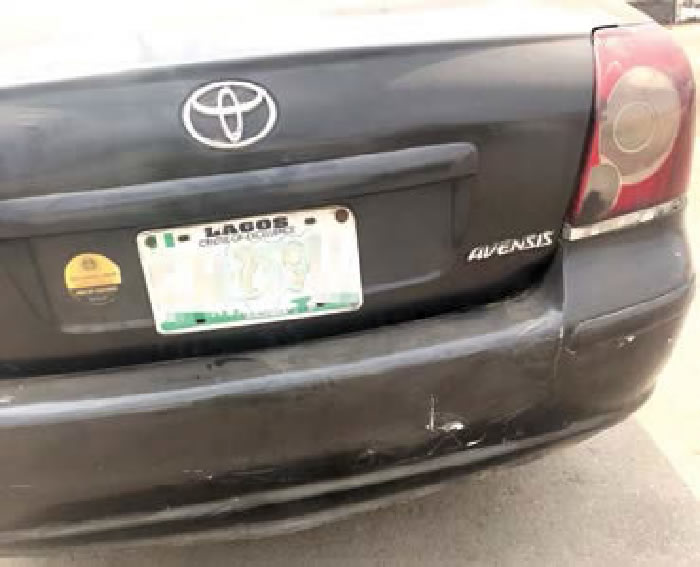Ayoola Olasupo examines the poor quality of government-issued means of identification and how security agents are taking advantage of the situation to extort money from their owners
When Olaitan Adediran woke up on Thursday morning to head for his workplace in Ogun State, he was confident his day would go without any hitches.
His hustle was legitimate and he was not indebted to anybody who might harass or hurt him. He observed his regular prayers and asked God to bless his day.
He was inside an 18-seater Toyota Hiace bus when some policemen ordered him and other passengers to alight for a routine stop and search. One of the policemen, who searched his bag, later requested his means of identification.
Adediran, 28, who narrated the encounter to Sunday PUNCH, said within minutes, he brought out his voter card and handed it over to the cop.
“That was the only ID I had on me. The policeman observed that my name was already wiped off and the picture was faint. It caused me serious embarrassment and almost ruined my day. I escaped being extorted by luck,” he stated.
But Adediran was lucky.
A Lagos resident, who only identified herself as Biola for security reasons, said personnel of the Federal Road Safety Corps in the state extorted N15,000 from her over faded number plates.
She said, “I was driving around Ketu last August when the FRSC men started stopping vehicles. When they reached mine, I was asked to come down. At first, I wasn’t moved because I had all my documents intact, so I handed over all the relevant documents to the officer that approached me.
“He checked everything, asked me some questions about the car ownership, driving licence, among others, after he did not find anything incriminating. The man handed over the documents to me.
“But after a few minutes, an officer suddenly rushed at us from the front. He was shouting, ‘Don’t let that woman go’. I was not even bothered about the drama he was performing until I entered my car and saw him standing in front of my car. He was shouting, ‘Madam, come down. Your number plates are not clear, they have faded. I was surprised. To cut the long story short, I eventually paid N15, 000. They said they wanted cash when I wanted to transfer the money to them.”
Another motorist, Busola Olanipekun, shared a similar tale.
She said some policemen attached to the Isolo Police Division, Lagos State, stopped her vehicle, claiming she displayed faded number plates.
According to her, she almost came to blows with the cops, adding that N5,000 was extorted from her before her Toyota Camry was released.
“Even the N5,000 we transferred to them, the transaction was carried out by my husband because I didn’t have any cash on me. I had to beg and sincerely, I felt embarrassed that day. If we had not paid that money, those policemen were ready to seize the car,” she stated.
Abimbola Showemimo, a fashion designer, said her voter card was less than five years old, yet faded.She said she obtained the card in April 2018 for the 2019 general elections but was surprised when the imprints started fading.
“My voter card is the only faded ID I have. I registered for it on February 21, 2018, and a temporary one was issued to me. Eventually, I collected the permanent voter card sometime in April same year.
“It was attractive when I received the card until recently when it started fading. I have not been able to use it since then. It has always been in a safe place where I keep my documents. I have never exposed it to any form of liquid,” she stressed.
A means of identification is a document either containing a photo, house address, signature and a unique number or barcode specifically assigned to an individual.
Such documents include permanent voter cards, birth certificates, national ID cards, passports, driving licences, and number plates, among others.
A native of Osun State, Abou Reedor, who has never used his PVC to vote since he obtained it in 2018, said he often kept the card out of reach because he was ashamed of its look.
A copy of Reedor’s PVC seen by our correspondent showed that except for the image, which was partially visible, other information on the card had peeled off.
The inscriptions, ‘Federal Republic of Nigeria, Independent National Electoral Commission’, written atop the card, are barely visible.
The name, address, occupation, and date of birth, among others, are faded, while the barcode at the back of the card is gone.
Reedor said, “I obtained my PVC in 2018 when we were preparing for the Osun State governorship election. As you can see, my name, address, date of birth and other important details have faded and my image is partially visible.”
He noted that the process of applying for a new card, which he described as stressful, would prevent him from seeking a new one.
“If the machine can bring out my details and my image is clearly seen, I don’t think they should deprive me of voting,” he added.
Another holder of the PVC, Comfort Adebare, said she noticed the damage to her card when the film used to protect its surface started peeling off.
She said she had stopped using it for official documentation.
The condition of the card, she said, forced her to abandon it, while she sought other means of identification.
“I registered for the voter card in February 2011 when I was in my final year at the university. Sincerely, I don’t know the exact thing that happened to the card. I just noticed it started peeling. My image is almost off the card because the edges are peeling too. The card itself is strong but the layer on it that contains my personal details and picture is of poor quality. I no longer use it. I think I only used it when it was in good condition. I already have a national ID card and a passport, so I don’t intend to get another card for now.”
Apparently, PVCs and number plates are not the only government-issued documents that are of poor quality.
A Lagos resident, Feyisetan Ijimakinwa, bemoaned the condition of his driving licence.
He explained that the information on his card was no longer visible.
Ijimakinwa said he was surprised that despite keeping the card in a safe place, together with her PVC, the information on the surface was fading.
He said, “The fact that these cards are fading despite being well kept in a safe compartment of my wallet with minimal handling surprises me. They could only be read under intense scrutiny.”
He noted that the bad condition of his PVC denied him the opportunity of voting during the 2019 general elections because the INEC card reader could not process it.
Residents tackle government
While there has been clamour that motorists should not be arrested by security operatives over faded number plates, drivers have said the motor registration agencies of government should be blamed for the poor quality of number plates across the country.
A motorist, who identified himself only as Mr Yusuf for security reasons, said it was demeaning that such agencies would issue out inferior number plates to vehicle owners.
He explained that he had neither washed his number plate with detergents nor scrubbed its surface with hoarse objects since he purchased his vehicle in 2014.
He said, “It is a bad thing that government agencies give out inferior number plates to us. This is not good for the government and the image of the country. My number plate was obtained in 2014 when I bought my car. I wonder why the number plate will just fade like that.”
Yusuf said he was ready to confront any government officials if arrested over the matter, adding that another number plate he secured for his car in 2017 had also waned.
“As far as the materials are concerned, they are inferior because they are not supposed to be fading like that. I have not been accosted by anybody so I don’t have the intention of applying for another one yet until I refurbish the car. If they accost me, I will let them understand that I obtained the number plate legally and I should not be arrested because it got faded,” he stated.
An Ogun State indigene, Dele Ayodele, said it was “absurd” that the government issued low-quality documents to citizens.
He stated that having to replace a number plate or other means of identification within a short period of time was a waste of resources.
“The materials used for producing the number plates are not good at all. We can’t compare them with the ones they bring from abroad. It is sad that the government did the number plate for us. Why should they arrest us for what we know nothing about?” he queried.
Another motorist, Ibe Peters, said it would be unfair if vehicle owners paid for the replacement of such number plates.
He said, “There is nothing I can do to my bad number plate and I won’t stop them from arresting me. What they should do is to give holders of faded number plates new ones without taking a dime from them.”
According to him, arresting innocent Nigerians over unclear number plates would translate to oppression.
“It may even lead to a protest. Since mine is completely faded already, if it is something I can afford to get at the moment, I will or else I will have to wait until I’m capable of renewing it,” he added.
Making quality ID cards
Commenting on the issue, a printing and quality expert, Olurotimi Kazeem, identified the importance of ink selection in the process of manufacturing ID cards.
He stated that there were different types of ink for specific types of printing.
According to him, ID cards may be coated to prevent them from fading.
“It also depends on the type of item you want to print, so one has to be very careful in the selection of inks. There are some coatings that can be used to protect ID cards from fading. When laminating them, there are some securities on the film used. The ink quality will surely affect the end process. When a quality machine is used for printing, quality materials should also be used if we want to get a good outcome,” he added.
In his contribution, the General Manager of Afkar Printing and Publishing Company Limited, Adewunmi Jacob, said a good quality UV-fast, otherwise called large-fast (the ink used in digital printing of cards) should be applied during the production of IDs for a greater effect on their durability.
He said when the pigment applied during production is low, the product should be expected to fade off, adding that a UV-fast is capable of extending the permanence of information on documents for a long period of time.
Jacob, however, stated that exposure of ID cards and number plates to the heat condition in Nigeria compared to other foreign countries could contribute to their physical depreciation.
He stated, “Over a period of time, no matter the quantity of UV-fast applied, exposure to sunlight and heat will still affect the products but it is dependent on the number of components or ingredients applied on that particular ink used in printing them.
“In this part of the world, where we have heat all year round, one should expect a high ink product but when we talk about foreign countries where the level of cold is higher compared to Nigeria; the nature of their environment is protecting those products. The large-fast pigment to be applied must be good enough to be able to protect all the strictures.”
He advised that producers of such items should make the products scratch-proof by applying coatings, which could either be on the surface or in form of lamination.
Number plates enhance security
The Lagos State Commander of the Federal Road Safety Corps, Olusegun Ogungbemide, said the law does not permit number plates to be faint within a range of 100 metres.
He explained that it would translate to a violation of traffic laws if vehicle owners continued to drive vehicles with faded number plates.
He said, “A number plate is one of the items mandated to be fixed to a vehicle according to the law for identification and security. So, in a situation where the number plate is not visible from 100 metres away, the law does not permit such plates should be used and in such circumstances, it allows the law to book the offender for the use of a non-visible number plate.

“Number plates could be non-visible in many ways such as the letterings are no more readable or it is broken or covered. It is necessary for identification and security purposes. When people use vehicles to perpetrate crimes, the only means to identify the vehicles is through the number plates they carry because every detail of the people that registered the vehicles would have been stored in the database.”
The corps commander said the agency would never issue number plates to individuals.
According to him, such duties are within the purview of states.
“FRSC issues number plates to states. Any liability as regards number plates should be conferred to states. The action taken by Lagos State now is that when you’re given your number plates, the template on how to protect them would also be handed over to you. So, they have also created that avenue to protect the number plates.
“When a new vehicle is bought, one has to register it and note the transformation from the old number plate to the new one, as put in place by the Federal Government.
“I’ve been using the number plates of all my vehicles since 2013 and they are not faded, so I think those that complain about theirs will be in the best position to give an account of why they are faded. Maybe I’m lucky not to have to use detergents or some other chemicals in washing them. If actually they are all products of the same company and mine have not faded, then why are others fading?” he queried.
The national spokesperson for the FRSC, Bisi Kazeem, said number plates could wear out over a period of time.
He said, “Vehicle owners are meant to pay for a replacement of fading number plates because every vehicle owner is responsible for the replacement of his or her fading or faded number plate. The fact that it accrues to the owner of the vehicle to repaint his or her car when the paint is faded, the same applies to the number plate.”
He added that when number plates are faded, they could only be replaced, not renewed.
Kazeem explained that replacement could be a result of loss, burning, fading and other conditions that might lead to the defacing of the product.
When asked the penalty for faded number plates, he said the corps only played an advisory role.
“There is no penalty for the use of faded number plates in the corps’ notice of offence booklet. What we do on that is strictly advisory because of the security implications of using the faded number plate,” he added.
The FRSC spokesperson said a readable number plate could help in enhancing intelligence when a vehicle was used for perpetrating a crime, but a faded number plate would deter such efforts.
He said faded number plates could be caused by regular exposure to sunlight, chemicals and other unfriendly weather conditions.
PVCs only for elections
A senior INEC official, who spoke on condition of anonymity, said faded PVCs were the results of improper handling.
The source explained that like passports, PVCs ought to be kept in isolated and safe places to prevent them from damage.
He said, “The card is getting faded because of the way it is being used by people. It is not something people should be taking around with them. It should be a document that should be brought out once in four years, but people take it out every day as a means of identification.
“People should get their National Identification Number, passports or driving licences rather than tendering their PVCs as their means of identification because the PVCs are not meant to be carried about. We should learn to do things right. That card is only meant to be used on election days.”
The Lagos State INEC Resident Electoral Commissioner, Olusegun Agbaje, said the state was not aware of such complaints.
He said, “I am not aware of that and we have not received any complaints about that. If that is happening, they should let INEC know about it. Nobody has reported to us and there is nothing like that.”
The INEC Commissioner for Information and Voter Education, Festus Okoye, did not respond to a text message and several calls to his phone number as of the time this report was filed.





